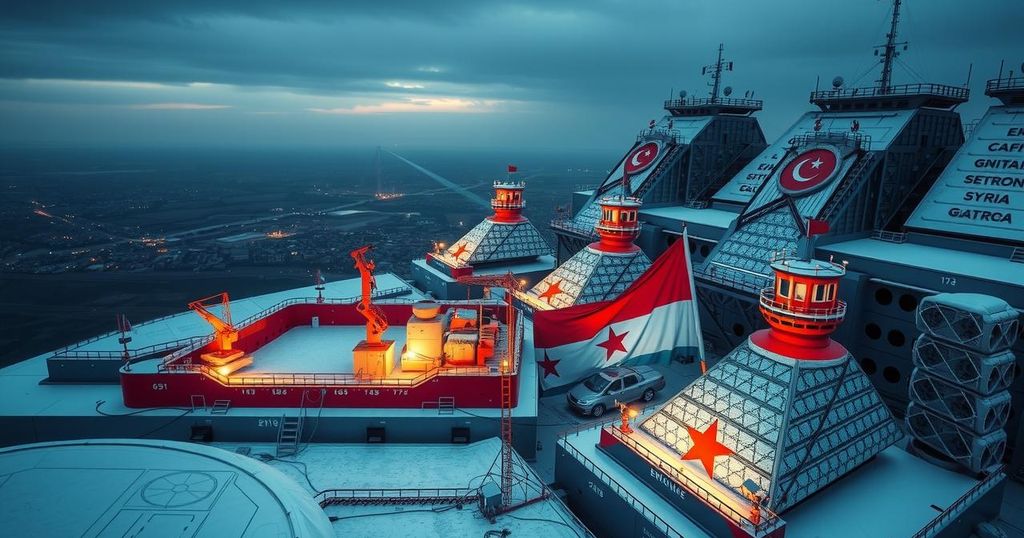World news
ANKARA, ASIA, ASSAD, CONFLICT, DAMASCUS, EAST, ERDOGAN, EUROPE/ASIA, FIGHTER JETS, HAYAT TAHRIR AL - SHAM, HTS, IBRAHIM KALIN, IDLIB, INTERNATIONAL CRISIS GROUP, KALIN, MIDDLE EAST, MOSCOW, REC, REFUGEE CRISIS, RUSSIA, SYRIA, SYRIAN CIVIL WAR, TURKEY, UMAYYAD, WAR
Daniel O'Connor
0 Comments
Turkey’s Diplomatic Strategy Following Assad’s Fall: A Path to Influence in Syria
Following the fall of Bashar al-Assad, Turkey has significantly repositioned itself in Syria, raising its flag in Damascus and engaging with various factions, including HTS, to enhance its influence. The Turkish government views this shift as an opportunity to facilitate reconstruction, address refugee issues, and strengthen its political presence in the region. However, this strategy carries inherent risks as Turkey navigates its relationships amid ongoing conflict.
In the wake of Syrian President Bashar al-Assad’s flight to Moscow, Ankara raised its flag over its reopened embassy in Damascus, marking a significant diplomatic milestone after 12 years. This pivotal moment followed a secretive visit by Turkey’s spy chief, Ibrahim Kalin, who emerged as a key figure in Turkey’s foreign policy maneuvering within the complex landscape of post-Assad Syria. Experts highlight Turkey’s strategic patience, with Kalin’s visit described as a ‘victory lap’ following Assad’s regime collapse, casting Ankara as a principal actor in shaping Syria’s political future and exerting influence in the power struggle in the northeast, particularly with Kurdish groups.
Despite historical tensions with Kurdish factions, Turkey is capitalizing on the shifting dynamics in Syria to enhance its position and interests, including encouraging the return of Syrian refugees. The Turkish foreign minister stated that Turkish companies would aid in Syria’s reconstruction, boosting economic prospects for Turkey. Ankara’s relationship with groups like Hayat Tahrir al-Sham (HTS) has been cautiously cultivated; while not a proxy arrangement, it allows Turkey to steer developments in the region and prevent Kurdish autonomy amid ongoing violence against rebel-held territories. The fall of Assad has unexpectedly opened various avenues for Turkish foreign policy, despite the inherent risks and complexities.
The aftermath of Assad’s overthrow has led to a surge in Turkish-backed forces advancing across northern Syria while solidifying Turkey’s role as a critical player in the region. Engaged in a careful balancing act within its domestic politics regarding Syrian refugees, Erdoğan leverages this moment to bolster his image as a protector of displaced Syrians. Analysts contend that the unexpected speed at which the insurgency ascended has taken Ankara by surprise, yet it presents an opportunity to affirm Turkey’s leading role in reconstruction and regional politics.
The current geopolitical dynamics in Syria have been significantly altered following the toppling of President Bashar al-Assad, leading to a reshaping of alliances and power structures in the region. Turkey, led by President Recep Tayyip Erdoğan, has sought to position itself as a central figure in post-Assad Syria, leveraging its influence through diplomatic visits and strategic support to various factions, most notably HTS. The complex relationship between Turkey, the Syrian opposition, and Kurdish groups has evolved amid the backdrop of a civil conflict that has precipitated a humanitarian crisis, with millions of refugees seeking asylum and a need for reconstruction efforts. The changing landscape presents both opportunities and challenges for Turkish foreign policy as it navigates its interests and regional stability.
In summary, Turkey’s recent maneuvers in Syria underscore a calculated approach to capitalizing on the geopolitical shifts following Assad’s downfall. Erdoğan’s administration aims to strengthen its influence in the face of growing complexities, particularly with the rise of HTS and interactions with Kurdish factions. As Turkey engages diplomatically and militarily to reshape the regional landscape, it presents both opportunities for enhanced international standing and challenges related to domestic politics and security concerns.
Original Source: www.theguardian.com




Post Comment